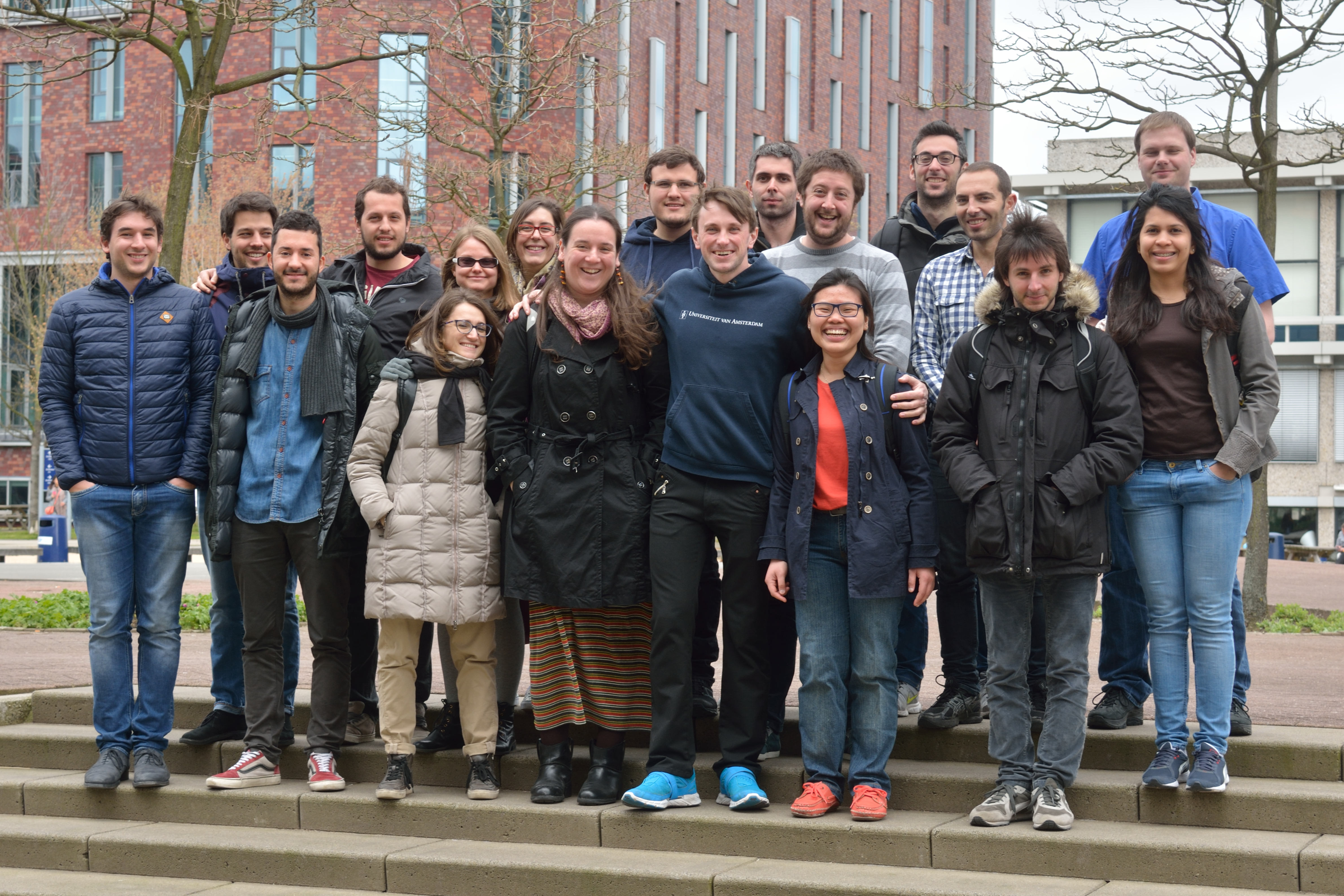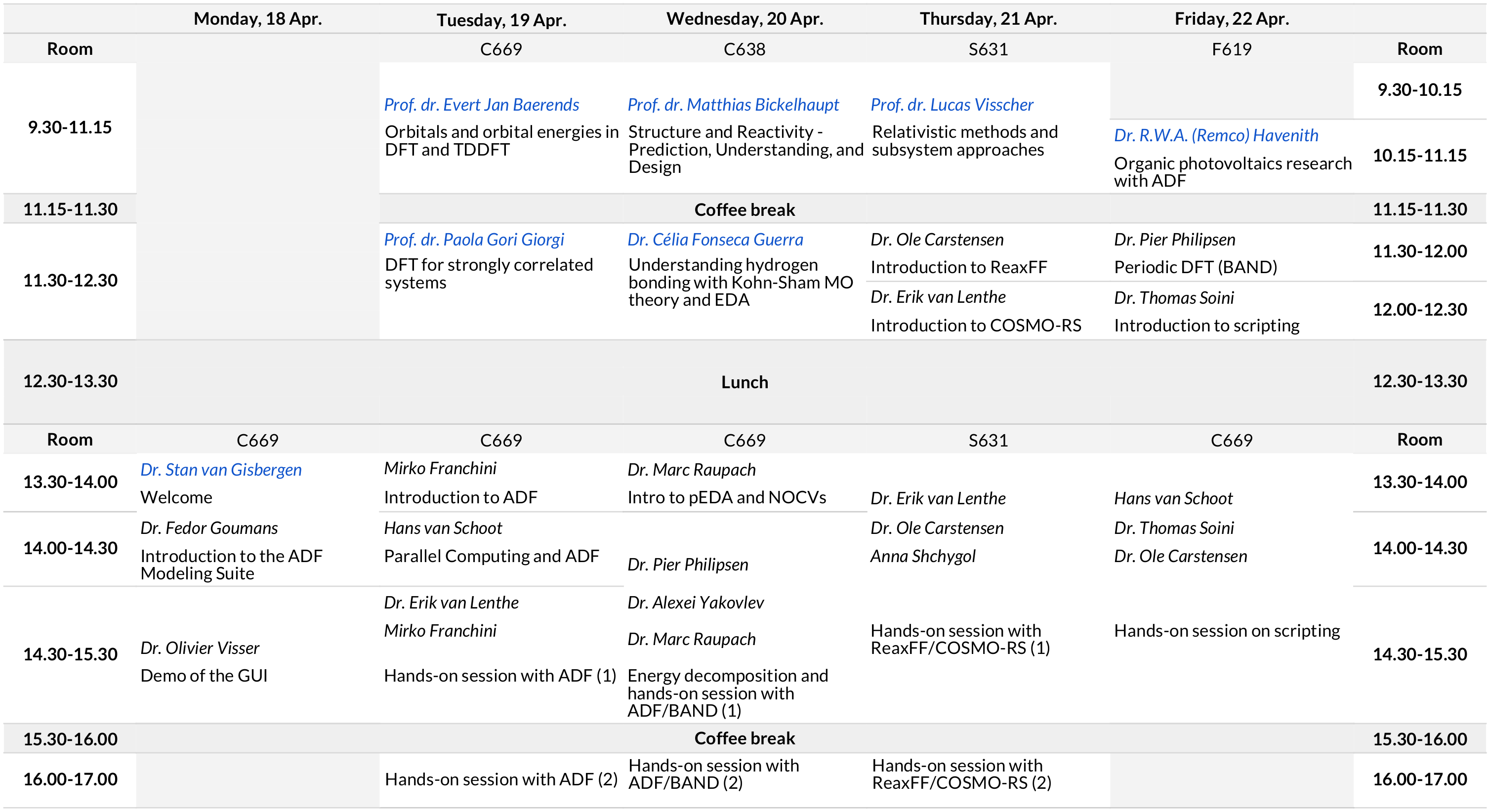TCCM ADF Tutorial
18-22 April 2016, Amsterdam



- News
- Preparation for the workshop
- Dates
- Programme
- Slides of presentations
- Hands-on sessions materials
- Logistics
- Contact
News
- We’ll be kicking off the sessions with lunch at 12:30 on Monday, in room C669 (6th floor, corridor C of the Faculty of Sciences building in the VU campus). In case you need to look for us, SCM is located in the R1 corridor (i.e. on the 1st floor), sharing it with the Theoretical Chemistry group.
- The hands-on sessions will assume that you have a working ADF2016 setup on your laptop. If you still haven’t installed the modelling suite, please do it ASAP, and let us know at support@scm.com of any issues.
Preparation for the workshop
- Please fill in this form if you’re a TCCM ESR, even if you won’t be able to attend the tutorial. It will take just a couple of minutes and it is essential, as it will allow us to arrange the tutorial logistics.
- Please bring your own laptop. The sessions will take place in rooms without workstations.
- Please install ADF2016 on your laptop before the workshop (you should have received an email with a license and installation instructions). We also encourage you to explore the interface and tutorials.
- For network access, eduroam is available. Please let us know in advance if you don’t have access to it.
Dates
The Tutorial will start on Monday, 18 April and will finish on Friday, 22 April.
Programme

Slides of presentations
- Introduction to the ADF Modeling Suite (Fedor Goumans)
- Orbitals and Orbital Energies in DFT and (TD)DFT (Evert Jan Baerends)
- Functionals from the strong-coupling limit of DFT: promises and challenges (Paola Gori-Giorgi)
- ADF technical overview (Mirko Franchini)
- ADF and parallel computing (Hans van Schoot)
- Theory of Chemical Bonding and Reactivity: Quantitative Orbital and Activation Strain Models (F. Matthias Bickelhaupt)
- Understanding hydrogen bonding with Kohn-‐Sham MO theory and Energy Decomposition Analysis (Célia Fonseca Guerra)
- Chemical bonding and extended systems – pEDA and pEDA-NOCV (Marc Raupach)
- Relativistic methods and subsystem approaches (Lucas Visscher)
- Introduction to ReaxFF: Reactive Molecular Dynamics (Ole Carstensen)
- COSMO-RS: fluid thermodynamics (Erik van Lenthe)
- OPV research with ADF (Remco W. A. Havenith)
- Is Band better than ADF? The core of the issue (Pier Philipsen)
- Introduction to scripting (Thomas Soini)
Hands-on sessions materials
- Energy Decomposition Analysis (Marc Raupach), xyz files: 2sqrtX2sqrt_struc.xyz, 2X2_struc.xyz, sqrtXsqrt_struc.xyz
- Scripts and test sets, instructions, demo (Thomas Soini)
Logistics
Venue
Please check the route description to our offices for directions and information about using public transport in Amsterdam.
We are located in the Faculty of Sciences building in the VU campus, and the sessions will take place in the same building, on different wings and floors. The rooms for the different sessions are specified in the programme, and their location within the building is reflected in their name: the letter corresponds to the wing, and the first digit to the floor. Thus, room C669 can be found on wing C, 6th floor.
Accommodation
We have booked accommodation for the TCCM fellows between the first and last days of the workshop (Monday 18 – Friday 20 April, 4 nights), at the citizenM Amsterdam hotel (not to be confused with the citizenM Schiphol Airport hotel). Those fellows who need it (and who have let us know either within the form or by email) will also be able to spend the nights of Sunday, 17 April and Friday, 20 April at the same hotel. The rooms are single and include a private bathroom, and the hotel is located by the Amsterdam Zuid station, less than a 10-minute train ride from the airport. It is within walking distance of the session rooms, which can also be easily reached by public transportation, using tram line 5 or metro line 51. The same lines also connect with the city centre, on the opposite direction.
Meals
Breakfast is included in the hotel booking, and lunch and coffee breaks will be served by the session rooms. The fellows will receive a daily allowance to cover for dinner and any other living expenses.
Contact
Contact us for any further details.